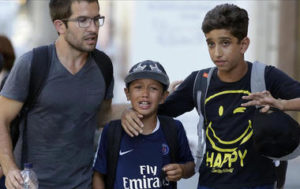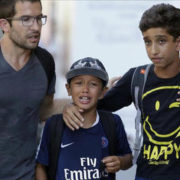How to Talk to Kids about the Barcelona Terror Attack: Tips & Scripts Included

credit: CBS
Just as we are trying to make sense of the loss, heartache and anger of what happened in Charlottesville, we are faced, again, with another act of terror in Barcelona. While adults are reeling, our children will likely have concerns and questions about what has just occurred. Here are some tips, conversation starters and scripts you can use to help talk about this terrible incident with your kids:
- Be their first source: I know this is hard as we don’t always know what to say to our children when scary things happen. But information is best coming from a trusted source—and that trusted source is you. You know your child and know how to be sensitive to the way your child needs to receive it. These details may have already started to leak out so it’s best not to wait. While you can limit gruesome details based on age and maturity, you can provide the information your children need to know to feel cared for and safe.
You can say: “Someone who has hate in their heart and is angry and confused about what is right, kind and fair, hurt a lot of people in Barcelona, a city in Spain, which is in Europe. A lot of people are very upset right now but the people in charge are doing everything they can to keep people safe.”
2. Let them know about the helpers: When situations seem unsure, children need to know that the grown-ups are helping those in need. Kids become very nervous that they will be left on their own if something bad happens and some anxiety can be alleviated by being sure that someone is in charge of safety.
You can say: “Authorities are working to keep people safe. The police have already found the person who caused the harm to the people in Barcelona. Medical staff, like doctors and nurses, are helping those who have been hurt.”
3. Let them know they are safe and these incidents are very rare: While tragedy recently struck Charlottesville, this does not mean that fatal acts of hate and terror are happening all the time. What are the kids thinking right now? They are thinking about their own safety and the safety of those they love. My daughter asked, when we spoke about the sad and angering act of hate in Charlottesville, “Is this going to happen here?”
You can say: “These kinds of incidents are extremely rare, my love, and the people in charge are doing everything they can to keep everyone safe.”
4. Stay calm: You are human. It is normal and natural to feel angry, sad, shocked or even numb when senseless acts occur. As a parent, teacher or child mentor, being “there” for young people sometimes means keeping our emotions in check so that we don’t overwhelm or alarm our children. While you certainly don’t need to be stoic or aloof—and you can talk about your sad or angry feelings when terror attacks happen—the full gravity of your feelings should be reserved for other trusted adults in your life.
You can say: “It makes me feel very sad and angry when I hear that someone who has hate in their heart hurts other people. It’s not right or fair. How do YOU feel about it?”
5. Expect that questions may not all come out at once: Children often need time to process information—especially information that is upsetting, confusing or surprising. It’s normal for children to have questions about sensitive topics over time. It may go on for weeks—a question here and a question there—never lasting more than a minute or two. Other times you may have a few longer conversations. Children process tough topics in different ways. It’s OK if you don’t know the answer— you can always tell your children that you will look up the answer and get back to them when you know. It’s also completely OK to say “I don’t know” when the answer is not answerable. Be a source of comfort—and know when your child has had enough.
You can say: “I’m happy to answer your questions. What do you want to know?” And “I’m really not sure of the answer to that question right now, but I will look it up and get you the answer.” Or “I wish I knew for sure that this kind of thing will never happen again. What I do know is that the person who did it was captured by the authorities and can no longer hurt anyone.”
6. Remain open to dealing with fears and concerns: Don’t be surprised if fears and concerns seem illogical, disconnected and come at unusual times. You might be driving your child to school on a beautiful sunny day when your child pops a question about something that happened days or even weeks before. Your child may develop a temporary fear of the dark, loud noises, people in uniform or otherwise while trying to regain their footing. Be patient and open to talking, reassuring and even just “there” during these tough times. This is tough for everyone.
You can say: “Is there something I can do to help you feel safer or more secure?” or “Would you like advice or would you prefer that I just listen?”
7. Know that unusual conduct or feelings may arise: Sometimes frightening and unexpected news can make children act out different ways. These behaviors may surprise you. Some kids may become clingy or hyper while others may become withdrawn and quiet. Some may sleep more while others may sleep less. Still others may eat more while others may report that they aren’t hungry.
You can say: “Would you like to talk about your feelings? I am always here to listen. Your emotions are all OK and what you feeling is normal when bad things happen. You can feel any way that you do
8. Don’t stop living: It is natural to want to protect your family when bad things happen. You may be wishing that you want to construct a bubble for everyone you love to live in just to keep potential dangers out. I get it. I’m a parent too. But living in fear is no way to live. Instead, enjoy everyday. Love deeper. Hug longer. And remember, there is more good than bad in the world.
You can say: “I am so grateful for you. And I’m thankful for all those who work around the clock to keep us safe and healthy. Would you like to talk about why you are grateful today? What have you been able to do today because there are wonderful people who help us stay safe?”
(9) Focus on the good: And don’t forget to remind your children of the good in the world. There are everyday people doing wonderful things. We don’t always hear about them, but there are. There are people who are solving medical mysteries and there are people who are building schools and helping children in need.
You can say: “There are kids, just like you, helping the new child at school, talking to the scared friend on the bus, standing up to someone who is being unkind and giving a hug to a friend who is feeling sad. You do many kind things to help others. What have you done to help someone today? How did someone else help you?”
(10) Allow them to contribute: People often remind kids to look for the helpers in this world—and that is a wonderful strategy. But just as important is to allow your child to find a way to be helpful. Instead of blocking out the world, let us teach our children to become the kind of people that make this world a better place. Children thrive when they feel that they can contribute to their family, their community, their country and beyond. Encourage them to do that. They may even be able to help the people of Barcelona as the charities who are providing assistance emerge. By doing so, you will teach them that there is a lot more good in this world than there is evil. And, yes, they are a big part of that good. In other words, they don’t just need to look for the helpers, they can become them.
You can say; “How can we be helpful to someone who is suffering today?”
This is a tough time but let’s keep the path of communication open. It is a source of connection and love—and lord knows we need more of that right now.
Thinking of Barcelona and all those who are grieving losses due to hate or terror attacks right now.
xo


